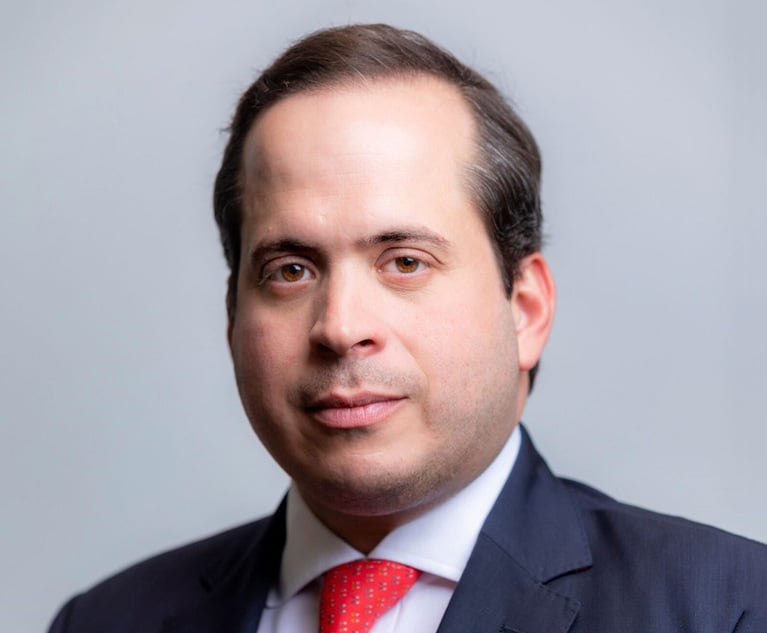Becker & Poliakoff Sees Opportunity to Expand Its Commercial Practices
Law firm managing shareholder Gary Rosen focuses on expansion and is overseeing the rollout of a new brand identity.
January 23, 2018 at 04:24 PM
5 minute read

Gary Rosen, managing shareholder with Becker & Poliakoff, responds to a series of questions as part of a series profiling midsize law firms in Florida.
How big is your firm, where is it located and what are its primary areas of
practice and focus?
Becker & Poliakoff is an East Coast law firm with headquarters in Fort Lauderdale
and 130 professionals at our offices throughout the state and in New York, New Jersey
and Washington, D.C. Our primary practice areas are: business litigation, construction,
government law and lobbying, real estate, corporate and community association.
Please explain your firm's governance structure and compensation model.
The firm is governed by a management committee of seven senior shareholders,
including myself as managing partner. Our compensation model is nonformulaic based
on financial performance together with a number of intangible factors.
What do you view as the two biggest opportunities for your firm, and what are
the two biggest threats?
Our biggest opportunity is the continued expansion of our commercial practices,
especially construction, commercial litigation and government law and lobbying. We
face the same threats as most of the legal industry: ever-increasing commoditization,
resistance to rate increases and growing competition.
After the recession hit, the prevailing theory was that midsize firms would start
to see more work come their way from large clients who could no longer justify
paying Big Law rates. What has been your experience?
We have benefited from the post-recession trend and seen a growing number of large
clients coming to us who can no longer justify paying Big Law rates. We pack a big
punch for a midsize firm and can deliver Big Law-quality work at less than
stratospheric rates.
Are your clients pushing for more alternative fee arrangements, and if so what
types? Is your firm amenable to those requests?
We have always offered AFAs for our government practice but have over the past few
years made a strategic decision to offer them in our construction practice where we
have market-leading expertise and an ability to carefully evaluate cases.
There is much debate around how law firms can foster the next generation of
legal talent. What advantages and disadvantages do midsize firms have in
attracting and retaining young lawyers, particularly millennials?
We don't suffer from the disadvantages of a larger firm in that we don't have the same
level of turnover. Because we are smaller, we are able to preserve our firm's culture,
emphasizing training and career growth. We periodically run programs geared to our
younger attorneys and continually discuss their concerns, elicit their input and ensure a
real quality of life balance.
One of the advantages of being a midsize firm, at least for us, is that mentorship here
is a constant. It happens daily and informally through collaboration with and guidance
from senior attorneys.
Does your firm employ any nonlawyer professionals in high-level positions
(e.g. COO, business development officer, chief strategy officer, etc.)? If so, why is
it advantageous to have a nonlawyer in that role? If not, have you considered
hiring any?
Yes, we do. We have nonlawyers who head four critical functions of the firm:
Administration — chief administrative officer, Finance — chief financial officer,
Marketing and business development — chief marketing officer, and Information
Technology — IT director. As a firm, we recognize that in these critical business areas
we need specialists with deep experience to perform these functions at the highest
professional level. Our firm operates more efficiently, and our attorneys can focus on
what they do best.
What, if any, technology advancements have you made in your firm in recent
years? What are the challenges in implementing tech changes?
We are constantly implementing state-of-the-art networks and integrated technologies
across all of our offices. All departments have specific technologies to support their
business functions.
What would you say is the most innovative thing your firm has done recently,
whether it be internal operations or how you work with clients?
You will be seeing the results of our most recent innovation in the coming months with
the rollout of our new brand identity. It's been a truly collaborative effort through
comprehensive working groups internally and extensive research. Clients and even
competitors were interviewed to smartly define and position our firm for strategic growth
in the coming years.
Does your firm have a succession plan in place? If so, what challenges do
you face in trying to execute that plan? If you don't currently have a plan, is it an
issue your firm is thinking about?
We went through a significant succession event six years ago and navigated it quite
successfully. We are constantly working to develop our mid-career lawyers and provide
opportunities for leadership in administrative areas and in our practice groups.
This content has been archived. It is available through our partners, LexisNexis® and Bloomberg Law.
To view this content, please continue to their sites.
Not a Lexis Subscriber?
Subscribe Now
Not a Bloomberg Law Subscriber?
Subscribe Now
NOT FOR REPRINT
© 2025 ALM Global, LLC, All Rights Reserved. Request academic re-use from www.copyright.com. All other uses, submit a request to [email protected]. For more information visit Asset & Logo Licensing.
You Might Like
View All
How Uncertainty in College Athletics Compensation Could Drive Lawsuits in 2025

'As I've Grown Older': John Morgan Looks Back at a Life in Law

Race for Clerk and Comptroller in Miami-Dade: Juan Fernandez-Barquin vs. Sen. Annette Taddeo
11 minute read
Meet Jesus M. Suarez: New Chair of the Eleventh Circuit Judicial Nominating Commission
4 minute readTrending Stories
- 1Munger, Gibson Dunn Billed $63 Million to Snap in 2024
- 2January Petitions Press High Court on Guns, Birth Certificate Sex Classifications
- 3'A Waste of Your Time': Practice Tips From Judges in the Oakland Federal Courthouse
- 4Judge Extends Tom Girardi's Time in Prison Medical Facility to Feb. 20
- 5Supreme Court Denies Trump's Request to Pause Pending Environmental Cases
Who Got The Work
J. Brugh Lower of Gibbons has entered an appearance for industrial equipment supplier Devco Corporation in a pending trademark infringement lawsuit. The suit, accusing the defendant of selling knock-off Graco products, was filed Dec. 18 in New Jersey District Court by Rivkin Radler on behalf of Graco Inc. and Graco Minnesota. The case, assigned to U.S. District Judge Zahid N. Quraishi, is 3:24-cv-11294, Graco Inc. et al v. Devco Corporation.
Who Got The Work
Rebecca Maller-Stein and Kent A. Yalowitz of Arnold & Porter Kaye Scholer have entered their appearances for Hanaco Venture Capital and its executives, Lior Prosor and David Frankel, in a pending securities lawsuit. The action, filed on Dec. 24 in New York Southern District Court by Zell, Aron & Co. on behalf of Goldeneye Advisors, accuses the defendants of negligently and fraudulently managing the plaintiff's $1 million investment. The case, assigned to U.S. District Judge Vernon S. Broderick, is 1:24-cv-09918, Goldeneye Advisors, LLC v. Hanaco Venture Capital, Ltd. et al.
Who Got The Work
Attorneys from A&O Shearman has stepped in as defense counsel for Toronto-Dominion Bank and other defendants in a pending securities class action. The suit, filed Dec. 11 in New York Southern District Court by Bleichmar Fonti & Auld, accuses the defendants of concealing the bank's 'pervasive' deficiencies in regards to its compliance with the Bank Secrecy Act and the quality of its anti-money laundering controls. The case, assigned to U.S. District Judge Arun Subramanian, is 1:24-cv-09445, Gonzalez v. The Toronto-Dominion Bank et al.
Who Got The Work
Crown Castle International, a Pennsylvania company providing shared communications infrastructure, has turned to Luke D. Wolf of Gordon Rees Scully Mansukhani to fend off a pending breach-of-contract lawsuit. The court action, filed Nov. 25 in Michigan Eastern District Court by Hooper Hathaway PC on behalf of The Town Residences LLC, accuses Crown Castle of failing to transfer approximately $30,000 in utility payments from T-Mobile in breach of a roof-top lease and assignment agreement. The case, assigned to U.S. District Judge Susan K. Declercq, is 2:24-cv-13131, The Town Residences LLC v. T-Mobile US, Inc. et al.
Who Got The Work
Wilfred P. Coronato and Daniel M. Schwartz of McCarter & English have stepped in as defense counsel to Electrolux Home Products Inc. in a pending product liability lawsuit. The court action, filed Nov. 26 in New York Eastern District Court by Poulos Lopiccolo PC and Nagel Rice LLP on behalf of David Stern, alleges that the defendant's refrigerators’ drawers and shelving repeatedly break and fall apart within months after purchase. The case, assigned to U.S. District Judge Joan M. Azrack, is 2:24-cv-08204, Stern v. Electrolux Home Products, Inc.
Featured Firms
Law Offices of Gary Martin Hays & Associates, P.C.
(470) 294-1674
Law Offices of Mark E. Salomone
(857) 444-6468
Smith & Hassler
(713) 739-1250






